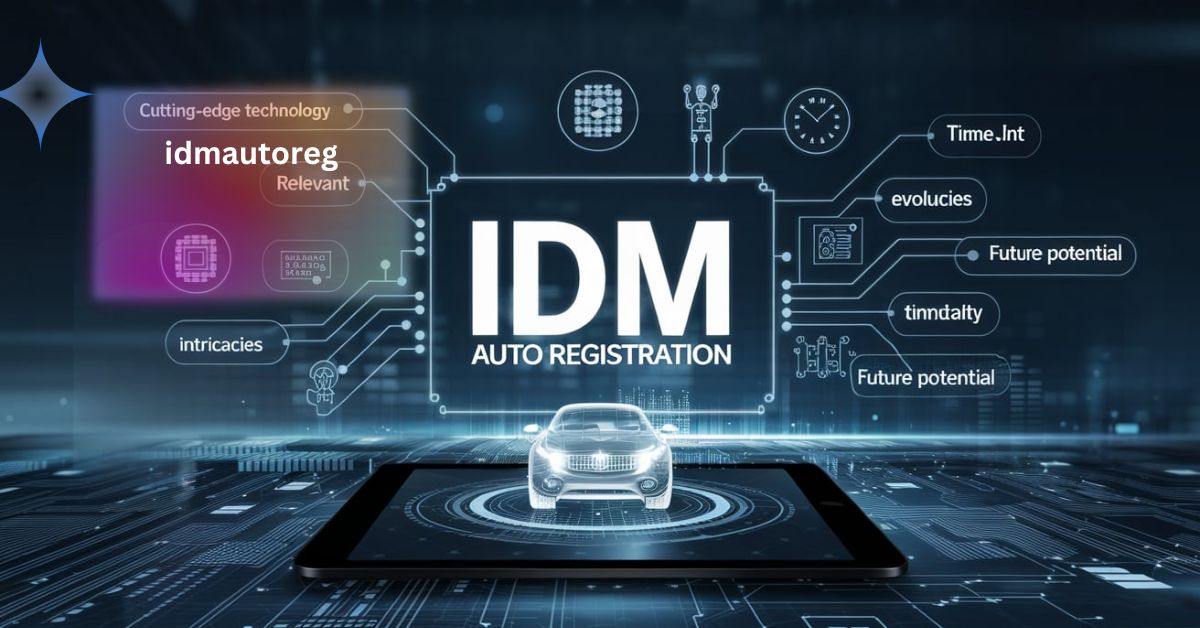idmautoreg: Revolutionizing Digital Information Management
In today’s fast-paced digital landscape, where information flows ceaselessly and time is of the essence, IDM auto registration has emerged as a game-changing innovation.
This powerful tool represents the seamless integration of cutting-edge technology with the human need for timely and relevant information. In this comprehensive guide, we’ll explore the intricacies of IDM auto registration, its evolution, functionality, impact, and future potential.
Understanding IDM Auto Registration
IDM auto registration, short for Intelligent Data Management Auto Registration, is a sophisticated system designed to streamline the process of collecting, organizing, and distributing digital information. This technology automates the registration and management of data, ensuring that users receive relevant information promptly and efficiently.
The concept of IDM auto registration has its roots in the need for more effective information management in an increasingly data-driven world. As the volume of digital data continues to grow exponentially, traditional methods of information management have become inadequate.
IDM auto registration addresses this challenge by leveraging artificial intelligence and machine learning algorithms to automate the process of data categorization, storage, and retrieval.
The Evolution of Digital Information Management
To fully appreciate the significance of IDM auto registration, it’s essential to understand the evolution of digital information management:
- Manual Data Entry Era: In the early days of digital information management, data was primarily entered and organized manually. This process was time-consuming, error-prone, and inefficient.
- Basic Automation: The introduction of simple automation tools marked the next phase, allowing for some level of automated data entry and basic categorization.
- Rule-Based Systems: As technology advanced, rule-based systems emerged, enabling more sophisticated data management based on predefined criteria.
- Artificial Intelligence Integration: The integration of AI and machine learning algorithms revolutionized information management, paving the way for intelligent systems like IDM auto registration.
- Cloud-Based Solutions: The advent of cloud computing further enhanced the capabilities of information management systems, allowing for greater scalability and accessibility.
IDM auto registration represents the culmination of these advancements, offering a powerful solution for managing the complexities of modern digital information.
How IDM Auto Registration Works
At its core, IDM auto registration operates on a series of sophisticated algorithms and processes:
- Data Ingestion: The system automatically collects data from various sources, including websites, databases, social media platforms, and internal company systems.
- Data Classification: Using machine learning algorithms, the system analyzes and classifies incoming data based on predefined categories and user preferences.
- Metadata Generation: The system automatically generates relevant metadata for each piece of information, enhancing searchability and organization.
- Storage and Indexing: Classified and tagged information is stored in a structured manner and indexed for quick retrieval.
- User Profiling: The system creates and continuously updates user profiles based on individual preferences and behavior.
- Intelligent Distribution: Based on user profiles and data classification, the system intelligently distributes relevant information to the appropriate recipients.
- Continuous Learning: Through ongoing analysis of user interactions and feedback, the system continuously refines its algorithms to improve accuracy and relevance.
Key Features and Benefits
IDM auto registration offers a wide range of features and benefits that make it an indispensable tool for modern information management:
- Time Efficiency: By automating the process of data collection and organization, IDM auto registration saves countless hours of manual work.
- Improved Accuracy: The use of AI algorithms significantly reduces the risk of human error in data classification and distribution.
- Personalized Information Delivery: Users receive information tailored to their specific needs and preferences, enhancing the relevance of the data they receive.
- Real-Time Updates: The system provides real-time information updates, ensuring that users always have access to the most current data.
- Scalability: IDM auto registration systems can easily scale to handle increasing volumes of data without compromising performance.
- Enhanced Collaboration: By ensuring that relevant information reaches the right people at the right time, these systems facilitate better collaboration within organizations.
- Data-Driven Decision Making: The availability of well-organized, relevant information supports more informed and timely decision-making processes.
- Compliance and Governance: Advanced IDM auto registration systems include features to ensure compliance with data protection regulations and internal governance policies.
IDM Auto Registration in Various Industries
The versatility of IDM auto registration makes it valuable across a wide range of industries:
- Finance and Banking: In the financial sector, IDM auto registration systems help manage vast amounts of market data, customer information, and regulatory compliance documents.
- Healthcare: Healthcare providers use these systems to manage patient records, research data, and regulatory information, ensuring that critical information is readily available when needed.
- Education: Educational institutions leverage IDM auto registration to manage student records, research publications, and educational resources.
- Media and Publishing: News organizations and publishers use these systems to manage content libraries, track copyright information, and distribute content to the right audiences.
- E-commerce: Online retailers utilize IDM auto registration to manage product information, customer data, and market trends.
- Legal Services: Law firms and legal departments use these systems to manage case files, legal research, and compliance documentation.
- Government and Public Sector: Government agencies employ IDM auto registration to manage citizen data, policy documents, and inter-departmental communications.
The Impact on User Experience
The implementation of IDM auto registration has a profound impact on user experience:
- Reduced Information Overload: By filtering and personalizing information, these systems help users focus on what’s most relevant to them.
- Improved Productivity: Users spend less time searching for information and more time utilizing it effectively.
- Enhanced Decision-Making: Access to timely and relevant information supports better decision-making at all levels of an organization.
- Seamless Information Flow: IDM auto registration creates a more seamless flow of information across different departments and systems.
- Personalized User Interfaces: Many IDM auto registration systems offer customizable interfaces that adapt to individual user preferences and work habits.
Security and Privacy Considerations
While IDM auto registration offers numerous benefits, it also raises important security and privacy considerations:
- Data Protection: Robust encryption and access controls are crucial to protect sensitive information managed by these systems.
- Privacy Compliance: IDM auto registration systems must be designed and implemented in compliance with data protection regulations like GDPR and CCPA.
- Ethical Data Usage: Organizations must ensure that the automated collection and processing of data adhere to ethical guidelines and respect user privacy.
- Transparency: Users should be informed about how their data is collected, processed, and used within the IDM auto registration system.
- Data Accuracy and Rectification: Systems should include mechanisms for users to verify and correct their personal information.
Future Trends and Innovations
The field of IDM auto registration continues to evolve, with several exciting trends on the horizon:
- Advanced AI Integration: Future systems will incorporate more sophisticated AI capabilities, including natural language processing and predictive analytics.
- Blockchain Integration: The use of blockchain technology could enhance the security and traceability of data within IDM auto registration systems.
- Internet of Things (IoT) Integration: As IoT devices become more prevalent, IDM auto registration systems will need to adapt to manage and analyze data from these sources.
- Augmented Reality Interfaces: AR technology could revolutionize how users interact with and visualize data managed by IDM auto registration systems.
- Quantum Computing: The advent of quantum computing could dramatically enhance the processing power of IDM auto registration systems, enabling even more complex data analysis.
Implementing IDM Auto Registration: Best Practices
For organizations looking to implement IDM auto registration, consider the following best practices:
- Define Clear Objectives: Clearly articulate what you want to achieve with the system before implementation.
- Conduct a Thorough Needs Assessment: Understand your organization’s specific information management needs and challenges.
- Choose the Right Solution: Select an IDM auto registration system that aligns with your organization’s size, industry, and specific requirements.
- Ensure Data Quality: Implement processes to ensure the quality and accuracy of data entering the system.
- Provide Adequate Training: Ensure that all users are properly trained to maximize the benefits of the system.
- Regularly Update and Maintain: Keep the system updated and perform regular maintenance to ensure optimal performance.
- Monitor and Analyze Usage: Continuously monitor system usage and gather feedback to identify areas for improvement.
- Integrate with Existing Systems: Ensure seamless integration with other tools and systems used within your organization.
Case Studies: Success Stories
To illustrate the real-world impact of IDM auto registration, let’s examine a few success stories:
- Global News Agency: A leading international news agency implemented an IDM auto registration system to manage its vast content library. The system automated the process of tagging and categorizing news articles, images, and videos, resulting in a 40% reduction in content management time and a 25% increase in content discoverability.
- Multinational Corporation: A Fortune 500 company utilized IDM auto registration to streamline its internal document management process. The system automatically classified and routed documents to relevant departments, reducing processing time by 60% and improving interdepartmental collaboration.
- Research Institution: A prominent research institution implemented IDM auto registration to manage its extensive database of scientific publications. The system’s ability to automatically categorize and cross-reference research papers led to a 35% increase in research efficiency and facilitated several groundbreaking collaborations.
- Government Agency: A large government agency used IDM auto registration to manage citizen data and service requests. The system’s intelligent routing capabilities reduced response times by 50% and significantly improved citizen satisfaction ratings.
- E-commerce Giant: A major e-commerce platform implemented IDM auto registration to manage product information and customer data. The system’s personalization capabilities led to a 20% increase in sales conversion rates and a 15% reduction in customer support inquiries.
Challenges and Limitations
While IDM auto registration offers numerous benefits, it’s important to be aware of potential challenges and limitations:
- Initial Implementation Costs: The upfront costs of implementing a sophisticated IDM auto registration system can be substantial.
- Data Quality Issues: The effectiveness of the system relies heavily on the quality of input data. Poor data quality can lead to inaccurate classifications and distributions.
- Overreliance on Automation: There’s a risk of over-dependence on automated systems, potentially leading to a lack of human oversight in critical areas.
- Privacy Concerns: The extensive data collection and analysis involved in IDM auto registration can raise privacy concerns among users and stakeholders.
- Complexity: Advanced IDM auto registration systems can be complex to manage and may require specialized expertise.
- Adaptation to Organizational Culture: Implementing such systems often requires significant changes in work processes, which can face resistance within organizations.
- Continuous Updates: As technology and user needs evolve, IDM auto registration systems require ongoing updates and refinements to remain effective.
Frequently Asked Questions
What is IDM auto registration?
IDM auto registration, or Intelligent Data Management Auto Registration, is a sophisticated system that automates the process of collecting, organizing, and distributing digital information using artificial intelligence and machine learning algorithms.
How does IDM auto registration differ from traditional data management systems?
Unlike traditional systems that rely heavily on manual input and predefined rules, IDM auto registration uses AI to automatically classify, tag, and distribute information, making it more efficient and adaptable to changing data landscapes.
What industries can benefit from IDM auto registration?
IDM auto registration can benefit a wide range of industries, including finance, healthcare, education, media, e-commerce, legal services, and government sectors.
Is IDM auto registration secure?
When properly implemented, IDM auto registration systems incorporate robust security measures. However, organizations must ensure compliance with data protection regulations and implement strong encryption and access controls.
Can IDM auto registration integrate with existing systems?
Yes, most IDM auto registration solutions are designed to integrate with existing enterprise systems and can be customized to fit specific organizational needs.
How does IDM auto registration handle unstructured data?
IDM auto registration uses advanced AI algorithms to analyze and categorize unstructured data, such as emails, documents, and social media posts, converting them into structured, searchable information.
What are the key benefits of implementing IDM auto registration?
Key benefits include improved efficiency, enhanced accuracy, personalized information delivery, real-time updates, scalability, and support for data-driven decision-making.
How does IDM auto registration impact user privacy?
While IDM auto registration systems collect and process large amounts of data, they should be designed with privacy in mind, including features for user consent, data anonymization, and compliance with privacy regulations.
What future developments can we expect in IDM auto registration?
Future trends include more advanced AI integration, blockchain technology for enhanced security, IoT integration, augmented reality interfaces, and potentially quantum computing applications.
How can organizations ensure successful implementation of IDM auto registration?
Successful implementation involves clear objective setting, thorough needs assessment, choosing the right solution, ensuring data quality, providing adequate training, regular system updates, and continuous monitoring and analysis of system usage.
Conclusion
IDM auto registration represents a significant leap forward in the field of digital information management. By harnessing the power of artificial intelligence and machine learning, these systems are transforming how organizations handle the ever-growing volume of digital data. As technology continues to evolve, IDM auto registration will undoubtedly play an increasingly crucial role in shaping the future of information management across various industries.
Rewad more:






